#definition of taxation
Explore tagged Tumblr posts
Text
#fundamental principles of taxation#principles of taxation#definition of taxation#purposes of taxation#aspects of taxation#investing#how to#financial education#long-term investing#dividends#income#incorporation#taxation#income tax#tax#how to save tax#income tax return#how to file income tax return#income tax return filing#taxes#income taxes#indian tax system in hindi#income tax system in india#tax structure in india#basics of tax
0 notes
Text
Partnership taxation my beloved
#I'm in too deep with these tax studies#but legit the study materials keep being like “this is a difficult topic with a lot of definitions and boring information”#and then I get to it and it's all just fancy logic puzzles#If Jess has a partnership interest of X% and is supposed to receive guaranted payments of Y out of total profits Z...#How much is the deduction for the guaranteed payments?#Anyways if you want to talk business taxation please dm me its a nice way to practice for my exams lol#talk taxes to me
1 note
·
View note
Note
If your Revolutionary Mermaids is a musical, I am begging for a showstopping number full of absolutely wired sea-people called "Caffeine, Caffeine? What Does it Mean?" in the midst of the Boston Tea Party.
LMAO, and here I was imagining a parody of Under the Sea. 😂
"Let's dump the tea! Into the sea! Honey, this tea tax Is breaking all our backs -- okay, not really -- But we are Sons of Liberty! Just only for those who think like me... Darkened our faces 'cause we're all racists -- Let's dump the tea!"

#LMAO I'm sorry america but the whole boston tea party thing definitely can be teased#I'm not saying I don't jibe with the whole 'no taxation without representation' thing or with breaking up the british empire#but at the same time the vast majority of the rebels first engineering the chaos weren't that great of people#the sons of liberty *tarred and feathered* people -- easily one of the most vile things you can ever do to another person#loyalists were terrorized by people who marched lock-step with samuel adams -- and I'm sorry their freedoms were important too#and then yeah there's always the racism against native americans *and* blacks :I#ask me#personal#american revolution#mermaids
0 notes
Photo
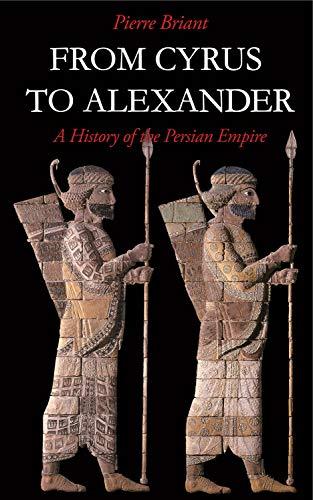
From Cyrus to Alexander: A History of the Persian Empire
"From Cyrus to Alexander" by Pierre Briant offers a detailed history of the Persian Empire, focusing on its administration, culture, and military. Briant highlights Persia’s innovations in governance and its tolerant, multicultural approach. The book challenges traditional Greek-centric views, presenting Persia as a complex and influential empire with a lasting historical legacy.
Pierre Briant’s From Cyrus to Alexander: A History of the Persian Empire is widely considered the definitive modern history of the Persian Empire. The book covers its origins under Cyrus the Great through its conquest by Alexander the Great. Originally published in French as Histoire de l’Empire Perse in 1996, the English translation made this monumental work accessible to a wider audience, expanding its influence in Near Eastern studies, ancient history, and comparative empires.
Briant’s book stands out for its focus on presenting the Persian Empire as an autonomous civilization rather than through the perspective of its Greek rivals. Historically, much of what Western scholars knew about the Persian Empire came from Greek sources like Herodotus, who often cast Persia as a monolithic enemy. By situating Persia at the center of its own narrative and making extensive use of archaeological findings, inscriptions, and administrative records, Briant counters this Eurocentric bias and offers a view of Persia as a sophisticated, multiethnic empire that left a significant legacy of governance, culture, and trade.
Briant structures the book in a way that mirrors the breadth of the Persian Empire, dedicating each section to a different aspect of the empire’s history, politics, economy, society, and culture. The organisation of the book reflects his emphasis on a systemic, comprehensive examination of the empire.
The early chapters detail Cyrus the Great’s conquests and policies of tolerance, which established a stable, expansive empire. Briant also examines governance, highlighting the balance between central control and local autonomy, the role of satraps, and the unifying use of Aramaic as an administrative lingua franca. Moreover, he analyses the Persian military apparatus, from its elite units like the Immortals to the logistical organisation enabling vast mobilizations by the Persians. He contextualises major conflicts, including the Persian Wars as part of a strategy to stabilize borders and secure valuable territories, rather than dominate all of Greece.
The book also dedicates significant attention to the Persian economy, exploring the empire’s agrarian base, trade networks, and taxation system. He shows how Persia’s economic policies were designed to support both the imperial treasury and local economies, creating a sustainable model that contributed to the empire’s longevity. The culture and religion section highlights Persia’s promotion of cultural integration and religious diversity. Briant shows how Persian art blended regional styles to symbolize royal authority and examines how Zoroastrian traditions coexisted with support for local religions, fostering loyalty among subjects.
One of Briant’s central arguments is that the Persian Empire’s strength lay in its policy of tolerance and inclusion. By allowing conquered peoples to retain their religious practices, local laws, and leaders, the Persians created a sense of allegiance that went beyond military domination. He also highlights the Persian administrative system as a model for later empires, like the Roman and Islamic. Innovations such as standardized taxation, the Royal Road, and an organised postal system enabled centralised yet flexible governance. His analysis of satrapies shows how Persia balanced regional autonomy with loyalty to central authority.
The book repositions the Persian Empire within a global context, highlighting its role in economic and cultural exchange across Asia and the Mediterranean. Through trade and diplomacy with regions like Egypt and Greece, Persia facilitated the flow of ideas and technologies, serving as a prototype for managing diverse populations and complex trade networks.
From Cyrus to Alexander is widely praised for its depth but critiqued for its daunting length and scholarly density. While excelling in its analysis of Persian administration and politics, it offers limited insight into the daily lives of ordinary Persians, focusing more on imperial strategies than social and cultural history.
This monumental work offers a detailed and balanced account of the Persian Empire, redefining its role in world history. Briant’s focus on understanding Persia on its own terms provides valuable insights into its governance, economy, and cultural integration, making it an essential resource for ancient Near Eastern studies.
Continue reading...
81 notes
·
View notes
Text
My Girlfriend Rates BG3 Characters Based On Vibes
My GF has never played Baldurs Gate and has limited knowledge of DnD or videogames in general, here are her thoughts:
Lae'zel (2/10)

"She looks like a teen boy tried to make a bangable bored ape NFT, kind of gives Gorillaz character vibes."
Shadowheart (7/10)
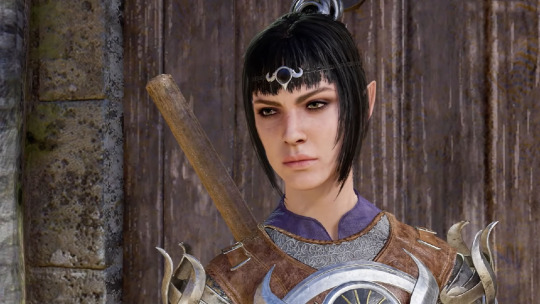
"Makes me think of a lesbian version of that guy from How To Train Your Dragon, kinda bangable. Not that the HTTYD guy is bangable, he's not, but-"
Karlach (11/10)

"Would smash. no questions asked."
Astarion (5/10)

"An extra point because he's zesty. Kinda has a vibe like he lures children into his white van. Only popular because of the vampire fetish tbh."
Wyll (8/10)

"That's just a good-looking man. My theory for his story is that he's adventuring during a midlife crisis and he thinks taxation is theft."
Gale (7/10)

"Chiseled jawline, nice. Not into beards though. Definitely likes his nipples rubbed during sex, I just know this."
BONUS Minthara (1/10)

"Vibes are absolutely rancid. Looks like Gollum before he found the ring. I don't like her."
BONUS Halsin (8/10)

"Friendly energy. Looks like he has a huge schlong but he's kind of shy and humble about it. Not my type but I'm sure people love him. This is the bear guy????"
#bg3#baldur's gate#baldurs gate 3#astarion#bg3 halsin#wyll#astarion bg3#bg3 shadowheart#lae'zel#halsin#laezel#bg3 wyll#wyll ravengard#baldurs gate wyll#gale of waterdeep#bg3 gale#bg3 karlach#karlach
605 notes
·
View notes
Text
Umm… HELLO-O!!!
Blocking me is not a win
Blocking me does not show evidence to prove your point
Blocking me does not prove me wrong
Blocking me definitely, definitely does not shut me up
Gang-flagging my posts does not stop me
Reporting me to Staff and getting my blogs terminated or shadow-banned does not stop me
Telling me to kill myself is F'n stupid yo… I am already dead
Starting a blog on another site so you can talk shiz about me behind my back is chump-worthy and just made me into a bigger rock star yo
Yes, you guys… these lunatics were raised so ineptly by their moron parents that they actually started an off-site blog about me and thought that was heroic
Mis-gendering me is hypocritical and idiotic… especially in light of the fact that while I AM a girl, you are just morons, boys parading around as female. *Note: I am very good and longtime friends on Tumblr with two cross dressers and two trannies. I use the pronouns she and her in reference to them all, out of respect, and I address them as Ms _________ (fill in the blank with their female first names)
Liberalism is a disease
Liberalism is a mental illness
Liberalism is built on lies
America was not built on the backs of slaves
Marxism is bullshit
The theory of evolution is just that, a theory; and unproven
Fossil fuel is a lie
Climate change, global warming/cooling, rising sea levels, etc, are all a grift
The Democrats are responsible for all the plastic in our oceans
Taxation is theft
All gun laws are an infringement
Free Speech means all speech
It is not our war unless We the People say it is
Fuck that shooter and the people who propped him up
Vampires aren't real because they said so
*nods

Angie/Maddie🦇❥✝︎🇺🇸
#GOAT#rant#vent#fjb#fuck the shooter#solo roba di angie#non solo roba da angie#born a witch#vampire#here i am#2a#1a
100 notes
·
View notes
Note
What differs a Bronze Age Monarchy from a Feudal or Modern State Monarchy? For whatever reson I have always been given the impression that Bronze Age Monarchy is the ancient version of either the former or the later, but that does not sound right.
Yeah, that would be a major misconception.
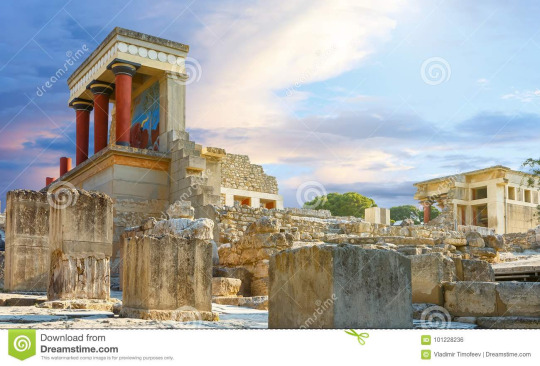
Bronze Age monarchies:
were far more centralized than medieval monarchies, with large, year-round palace complexes that functioned not just as fortresses but also as judicial centers, religious centers, storehouses, state planning apparati, and so on. To operate all these various functions, they employed a large bureaucracy that had, if not a monopoly, something of an oligopoly, on literacy, numeracy, and higher learning.
were highly involved in planning the economy, from organizing irrigation and other labor-intensive farming practices to keeping detailed records on production and taxation to coordinating the complex network of international trade that regulated the flow of both key commodities like tin but also luxury goods.
had more of a monopoly on military force, especially when it came to elite units like chariots. Training an archer and a driver to work in unison with a team of horses specifically bred to the task and custom chariots was a long and expensive process that only a monarch could provide the necessary surplus food and other resources for.
were not Christian. I can't stress enough how important this was as a structural force - Bronze Age monarchs did not have to deal with a large, European-wide, literate bureaucracy, with immense cultural power, that owned more land than they did. This isn't to say that there was no interaction between the temples and the state - I've talked recently about the tendency of Bronze Age monarchs to either be god-kings or priest-kings - but that the terms of interaction between the two much more heavily favored the state.
By contrast, medieval monarchies - and I'm aware that the term is something of a moving target, because what it meant to be a king in CE 600 is very different from what it means in CE 1100 or CE 1600 - were:
decentralized. They had small, peripatetic courts, and initially almost no bureaucracy. Governing power was much more broadly distributed down to the regional and local level through feudal contracts, and it was a long and very fraught process for the monarchs to gradually wrestle that power back.
much less engaged in the economy. Aside from tariffs and monetary policy, which is important, you don't really see medieval monarchs telling peasants when to plow and which fields (outside of the monarch's own personal fiefs), because that was an interference with the decentralized manorial system. You see fewer and smaller building projects, in no small part because the monarch usually couldn't afford to do them.
had less of a monopoly on violence. While the feudal exchange was supposed to give kings military service in exchange for land, in practice feudal levies could be slow to form, quick to disperse, and very fractious about their terms of service. This meant in practice that the nobility could exercise more hard power than their nominal overlords, which is why noble revolts were a common feature. Similarly, it took a long time for the monarchs to establish the necessary fiscal architecture for assembling professional armies and then eventually turning those professional armies into standing armies and then eventually turning those armies against the nobility - and by that point, we're not really talking about the Medieval period any more.
were Christian. And while there could certainly be exceptions of Emperors who picked Popes (instead of the other way around) or kings who could weirdly judo-flip their piety into Galician-style control of their national church, over time the pendulum definitely swung in favor of the Church having more power than any one monarch. They were wealthy, their wealth tended to grow over time because they were a corporate institution that invested their profits back into the company, they had huge amounts of cultural power, they had huge amounts of political power, and so on.
657 notes
·
View notes
Text
Anticipation
Happy tktober day 1!!! (≧◡≦) Following the prompt list by @august-anon , link here
☆ Day 1: Anticipation , Zhongli / Childe
In hindsight, messing with Zhongli during an official meeting was a mistake.
It wasn’t Childe’s fault though! Sat across from Zhongli within that tiny meeting room, close enough that their knees brushed every time he so much as breathed, it was impossible to ignore the older man’s voice waxing poetry about taxation and new zoning laws. It didn’t matter what the man spoke about: he did so eloquently, exquisitely, and Childe found himself hanging off every word. Which was something he couldn’t just do on the job with his subordinates not so discreetly throwing glances between him and the prettiest man in Liyue.
Of course he’d do something about it. It was a matter of his job!
Okay, so maybe touching the consultant’s knee mid-sentence was a little inappropriate. And he probably should have stopped when Katya caught his eye, or when Zhongli stiffened and shot him a glare mid-sentence. Perhaps, just a chance, he could have stopped at drumming his fingers on Zhongli’s calf instead of crawling them up towards the spot he’d knew would earn him a shriek…
If he did, at least he wouldn’t be squirming in anticipation like this.
“Are you reflecting properly?”
“Yes?”
Childe bites back a giggle as Zhongli responds not with words but another squeeze of his knee, fingers trailing almost carelessly along his leg. They are most definitely not careless though, not in the least, when the right hand very threateningly pulls at his bootstraps as the left drags slow fingers over his inner thigh. He barely manages to not flinch when those fingers deliver two sharp pinches to the sensitive area, grin spreading nervously across his face.
“Ajax?”
“Wha-huh?”
Zhongli’s lips twitch. The sound of his boot zipper being pulled down is suddenly the loudest noise in the room. “I asked what you were thinking about.”
“Oh, well, you know!” How about how the thud of his left boot against the floor echoes in his ear, or the way Zhongli’s fingers tighten around his side earning a choked yelp? Or the fact that he could probably dissolve into a literal puddle of Hydro before turning into a metaphorical one, but doing so means leaving the amused twinkle in Zhongli’s eye and he kind of doesn’t want to?
“I’m afraid I don’t know if you don’t tell me.”
“Zhoongliiiii,” he stresses. Not whines! He most definitely doesn’t whine, eyes pleading, as Zhongli thumbs his hips in a slow mimicry of how he’d teased the other during the meeting. The tightening of his grip on his ankle sends shivers up his spine, and a whimper escapes through clenched teeth.
“Yes, Ajax?”
Dear archons. It’s worse when he knows exactly what’s next but not when, and his leg bobs. A half giggle does escape his lips when Zhongli squeezes his ankle, fingers lazily spidering up his foot. Childe’s grin wavers on the edge of desperate as Zhongli’s other hand settles itself firmly on his waist; it seems he’s not the only one strung tight in anticipation.
He swallows. “Have… mercy?”
Zhongli smiles at last. It is every bit as beautiful as when it split his face hours ago at the meeting table, laughter brightening up the room, and the sight of it is almost enough to render Childe’s impending doom worth it.
“I will give as much mercy as you offer your foes.”
The last thought that rings through his brain before dissolving into begging and laughter is that maybe he should’ve paid more attention during the meeting and taken Hu Tao up on that 50% off coffin deal after all.
#genshin impact#tickling#chili#zhongchi#zhongli#childe#tickletober 2024#my fic#zhongli doesn’t kill him but childe does beg for his life at some point#hes just a drama queen its ok he’ll be back on his bs in a few days#zhongli lets him back into the meeting room expecting behavior only to be betrayed again next week#atp all of northland bank is sick of them#GET A ROOM BOZO#wikihow to tell your boss please stfu about your dragon bf
36 notes
·
View notes
Text
by Sophie Kalmin
The Roman period left various indelible marks on the Jewish psyche, further exhibited by the remains of the Masada fortress. Excavated in the 1960s, King Herod’s first-century BCE stronghold serves as a powerful symbol of Jewish resilience. It was at Masada that Jewish rebels stood firmly against the Romans before the fortress was destroyed, and the Romans marked another victory over the land’s people. Today, Masada serves as one of the most popular tourist sites in Israel, in which visitors can interact with ancient cisterns, pottery, and engineering feats completed by Jewish architects. With areas of the fortress still yearning to be excavated, Masada prevails as one of the most poignant reminders of the Jewish connection to the Land of Israel — Jewish people died defending it thousands of years ago.

Historians say…
Beyond archaeology, the writings of Flavius Josephus, a first-century Jewish historian, provide an insider experience of Jewish life and Roman governance in Judea. In his work Antiquities of the Jews, Josephus details the Roman administrative presence in the region, including the taxation policies implemented by the governor of Syria, Cyrenius. Flavius notes, “Moreover Cyrenius came himself into Judea, which was now added to the province of Syria, to take an account of their substance, and to dispose of Archelaus’s money.” This account emphasizes both Jewish property and economic activities in Roman Judea. Josephus’s comprehensive records serve as a critical source, underscoring the continuous Jewish involvement in this land across millennia.
Benjamin Tudela, the 12th-century author of The Itinerary of Benjamin of Tudela, records Jewish activity at the Cave of Machpelah. Tudela, a Jew living in the Middle Ages, describes the religious practices being exercised distinctly at this place. He writes that casks of generations of Israelites are buried within the cave and that our forefathers constructed “a gate of iron” to protect those visiting their loved ones’ remains. Because of Tudela, the stories of connection between Jewish people and their ancestors buried in the Land of Israel resonate more deeply.
Lasting Jewish Practice
The discovery of the Dead Sea Scrolls in the early 20th century provides arguably the most compelling evidence of the Jewish people’s enduring connection to their land and heritage. These ancient manuscripts, which date back to the last three centuries BCE and the first century CE, include the earliest known copies of the Hebrew Bible, providing invaluable insights into Jewish life, law, and beliefs during the Second Temple period. Written in Hebrew, Aramaic, and Greek, these scrolls are a powerful symbol of Jewish spiritual and intellectual resilience. Their survival over two millennia affirms the enduring legacy of Jewish scholarship and the community’s unwavering commitment to preserving their sacred texts.

Israel is the Jewish Homeland
When British ships landed in North America in the late 16th century, they didn’t dig up Shakespeare plays and find ancient coins minted in English. By definition, colonial powers are not indigenous to the places they colonize. Jews have maintained a continuous presence in Israel since Judaism’s inception, despite numerous conquerors that have come along and expelled the Jews from their land. These exiles are not only thoroughly documented in Jewish literature and cultural evolution, but in continuous archaeological findings. Failed attempts to eradicate the Jewish people from their land have reinforced the urgency of the lasting existence of a Jewish country.
50 notes
·
View notes
Text
After much discussion about the physical taxation of the act of grave robbery, my brother and I have decided that Victor Frankenstein is canonically, if not buff, and least pretty lean and decently strong.
we have therefore decided he is a smash because he could definitely just like, lift you and take you where he wants to go.
*Insert fantasy of Victor tossing you over his shoulder like a sack of potatoes here* Anyway
edit: upon further discussion, the general consensus among my irl friends is that he probably doesn't look super fit or anything, but definitely has good muscularity going on.
45 notes
·
View notes
Text
#investing#how to#financial education#long-term investing#dividends#income#fundamental principles of taxation#principles of taxation#definition of taxation#purposes of taxation#aspects of taxation#incorporation#taxation#income tax#tax#how to save tax#income tax return#how to file income tax return#income tax return filing#taxes#income taxes#indian tax system in hindi#income tax system in india#tax structure in india#basics of tax
0 notes
Text
Watcher, Capitalism, and the Petite (Petty) Bourgeois
So the whole Watcher controversy has revealed an interesting misunderstanding of what constitutes "the rich" or capitalist beliefs. The major theme that arose during the controversy was the sense that Shane in particular had gone against his previously stated leftist beliefs - that he had, for all these years, taken up a humorous aesthetic of anti-capitalism without actually believing in what he was saying. I believe that this is due to a breakdown in definitions as they become spread to the general public. Dissemination of information is a good thing, and I would never argue against it, but one problem which arises from concepts spreading to large groups without context is that often the actual meanings break down until they are vastly different from their original, academic denotation. This is, I believe, what happened with the phrase “eat the rich” and its current colloquial usage.
I want to preface this with the fact that nothing I am about to say applies exclusively to Watcher, or that the Watcher staff have done anything wrong or misrepresented themselves. I also don’t think that the Watcher fanbase is wrong at all – the situation just happened to spawn arguments both in defense of and critique of the Watcher team which indicated, in my opinion, that an understanding of “the rich” in a capitalist society is not well understood. Disclaimers out of the way, let’s get into this.
During the controversy, two major sides arose – those who had begun to see the Watcher crew (in particular Steven, Ryan, and Shane) as “the rich” or ruling class in a capitalist setting, and those who argued against this by arguing that as Watcher is a small business, and not the upper 1%, they are not included in the definition of “the rich” expressed by leftists. I want to focus in on the counter-argument that Watcher being a small business just trying to survive means that they are not considered “the rich.”
In Marxist theory, there is a small group called the “petite” or “petty bourgeoisie.” This group is defined as those who both own and contribute to the means of production – aka, small business owners. Marx himself wrote little about the petite bourgeoisie, predominantly referencing them in passing in his essays The Class Struggles in France, 1848-1850 and very briefly in The Communist Manifesto. He does happen to criticize this group in the little writing he did on it, “Marx derides what he sees as the petit-bourgeois self-delusion that, because it combines both employment and ownership of the means of production, it somehow represents the solution to the class struggle. This class was progressive in a limited sense, as witnessed by its claims at various times for co-operatives, credit institutions, and progressive taxation, as a consequence of felt oppression at the hands of the bourgeoisie. However, these were (in terms of the Marxist view of history) strictly limited demands, just as the ideological representatives of this class have been constrained by their own problems and solutions” (“Petite Bourgeoisie - Oxford Reference”).
Now, it is very important to note that team “Watcher is a small business” aren’t completely wrong in their positioning of Watcher’s attempt to raise more revenue as Not Evil Capitalism. Marx’s belief was that eventually the Petite Bourgeoisie would be pushed into the proletariat class. I also am not positive that Watcher is a classical small business – they very well could be a worker co-op. A worker co-op is a business where the workers have ownership of the company, and significant representation on the board of directors(“What Is A Worker Cooperative? – U.S. Federation of Worker Cooperatives”). While some criticism of worker co-ops from a communist or socialist view exist, they are generally seen as a more socialist approach to the typical small business model.
I couldn’t find direct confirmation that Watcher is a co-op. One point against them being one is the use of titles such as CEO and Owner, but these designations could simply be for tax and paperwork reasons. Watcher is an objectively small company, they have between 25 and 30 workers, and most people cite them currently having 27 workers, but in the past they have employed interns and I am unsure of if they currently have interns on board so I am going to stick to the range. It would be incredibly easy to have a worker co-op with 25-30 people, you wouldn’t even need voted representatives; everyone could just be on the board and contribute to decisions. I figured the next best approach would be to see what the roles on Watcher’s shows are – if Steven, Shane, and Ryan contribute significantly rather than just showing up and looking pretty on camera, then there is a good chance they might be functioning as a worker co-op more than a traditional business or small business.
To do this, I decided to look at Watcher’s largest show for each co-owner. This means Ghost Files, Mystery Files, Puppet History, and Steven’s food series. These numbers broke down as follows:
Ghost Files: Ryan is listed as a Creator on all Ghost Files videos. Ghost Files Debriefs do not have writers, so that role will not be held against them on those videos. Ryan and Shane were listed as a Host and an Executive Producer on all videos, but neither ever held a Writer, Editor, or Sound Mixing role.
Mystery Files: Ryan and Shane were listed as a Host and an Executive Producer on all videos, but neither ever held a Writer, Editor, or Sound Mixing role.
Puppet History: Shane is listed as a Creator on all Puppet History videos. He is listed as a Host on all videos, an Executive Producer on all videos, Writer on 4 videos, and never held an Editor or Sound Mixing role.
Steven’s Food Series: Steven is listed as a Host and an Executive Producer on all videos, but neither ever held an Editor, or Sound Mixing role. This show does not require a writer so this will not be held against him.
*Do take these numbers with a grain of salt, I wrote this while in class so its possible that I missed something.*
Looking at those numbers, the main three do predominantly just film, but I don’t want to devalue the work that goes into being on camera. They are still generating capital by acting, I simply wanted to clear up confusion I had due to seeing people say they edited every Ghost Files video. From what I can see, they don’t do the editing, but as executive producers they likely have to review every video before it goes out. I also still can’t fully come to a conclusion on if the company can be considered a worker co-op, but I believe it is a standard small business – aka, the petite bourgeoisie.
All of that leads to the final point – the way that people only began to view the three lead Watcher members/founding members as “the rich” after the announcement of the streaming platform shows the way that leftist theory has become divorced from some of its meaning. I saw several people arguing “you guys can’t recognize the rich”/”you guys would attack doctors and lawyers under the guise of eating the rich,” and yes its true that doctors who work in hospitals are proletariat, but if a doctor opens a private practice or a lawyer opens a private firm, does that render them more bourgeoisie or more proletariat? At what point do the petite bourgeoisie become a part of those who we disavow? I don’t actually have answers to these questions, and I’m sure people much smarter than me or better versed in economics have written on this (one source I found that seemed good while I was skimming it despite its age is this one https://www.jstor.org/stable/2083291?seq=3 ). I didn’t make this point to argue one point over the other on whether Watcher counts as “the rich,” but more to focus on the way that term gets used. The argument could be made that we could have started questioning Shane’s anti-capitalist beliefs the moment he helped start a company, but we didn’t. We only started to criticize him on the basis of hypocrisy after the announcement and its out of touch comments. This raises so many questions about how we use the term “the rich” now – does it refer to anyone we dislike who is financially stable? Has the term become completely divorced from its original meaning? Or were we being hypocrites all along? Has Watcher Entertainment always been incongruent with Shane’s implied political beliefs? Is there a certain point at which the petite bourgeoisie become a part of the financial aristocracy? Or is that term only relegated to the industrial bourgeoisie, is it reserved exclusively for those in financial positions that no artisan could ever hope to reach?
Is it possible that both arguments are correct regarding the Watcher boys, and all other members of small business ownership and management positions? That they are both “the rich” but not a part of the proper bourgeoisie?
I don’t know. I find it fascinating though.
#watcher#ghoul boys#watcher entertainment#ryan bergara#steven lim#shane madej#watcher tv#we are watcher#this is really my distracted musings#its probably not very coherent#like i said#i am in class#meta#i guess???
43 notes
·
View notes
Text
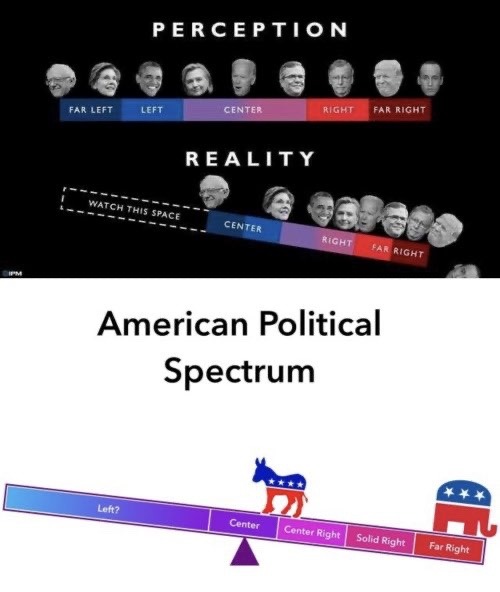
False Equivalence
Why does the mainstream media keep depicting lunatic-right Republicans and normal Democrats as equidistant from the center?
With the final passage of the debt ceiling deal, Democrats got off easier than one might have expected, given that it was a deal between a mainstream Democratic president and a Republican House in thrall to the lunatic far right. In drastic contrast to the scorched-earth budget bill initially passed by the Republican-controlled House, the cuts were about par for the course in a divided government; and they spare the country a repeat of this debt-hostage ordeal for two years.
However, much of the media played the agreement as a compromise between two equal extremes. The New York Times story about the House passage of the deal included this astonishing sentence: "With both far-right and hard-left lawmakers in revolt over the deal, it fell to a bipartisan coalition powered by Democrats to push the bill over the finish line, throwing their support behind the compromise in an effort to break the fiscal stalemate that had gripped Washington for weeks."
Think about that for a moment. There is no doubt that Matt Gaetz, Elise Stefanik, Lauren Boebert, Paul Gosar et al. are far-right by any definition, as white supremacists, Christian nationalists, election deniers, and nihilists on fiscal policy.
But no Democrats in the House can fairly be described as hard left. Those who voted against the deal included moderate liberals such as Joaquin Castro, mainstream progressives like Rosa DeLauro and Jan Schakowsky, as well as self-described democratic socialists including Cori Bush and AOC. But none of them are "hard left," which suggests anti-democratic, any more than Franklin Roosevelt was hard left.
The Times coverage reinforces a narrative of false equivalence that the media keeps repeating, with lazy catchphrases like "partisan bickering." It also plays into the hands of corrupt No Labels and Third Way types, who promote the idea that the best course for the republic is to split the difference between neofascists and a normal mainstream Democratic Party and president.
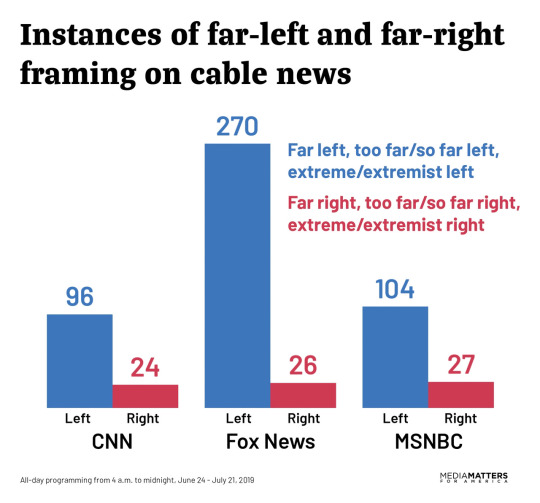
Big media, obsessed as it is with the appearance of fair and balanced coverage, took years to give itself permission to accurately describe Donald Trump with the impolite word "liar." But its treatment of the two parties as in any sense symmetrical is far more insidious than using euphemisms to characterize Trump’s lies.
Our friend Peter Dreier, whose observations inspired this post, points out that by any reasonable definition, "even the most left-oriented Democrats (AOC, Bush, Bowman, Raskin, Jayapal) are not extremists. They are shades of social democrats. They are pro-union, pro-choice, pro-affirmative action, pro-LGBT equality, pro-Green New Deal, pro-progressive taxation. But the most right-wing Republicans are extremists and reactionaries."
(continue reading)
#politics#false equivalencies#false narratives#media bias#both sides journalism#republicans#the media is complicit#false neutrality#third way#no labels#3rd way
255 notes
·
View notes
Text
Ask Me Anything -- Keldin Sands
What were your initial thoughts upon being woken up and told you're the captain now?
For a solid week, I was dead certain that I was dreaming. I mean. I went to sleep under the assumption I’d be waking up in orbit around Hylara, then suddenly I’m waking up in the medbay but we’re still years away and the crew isn’t there and instead there’s these new people and the captain is Doctor Aspen Greaves? And then everyone’s like, oh, actually you’re the captain now? Yeah, I definitely assumed this was a coma dream. It took me a while to accept otherwise.
To be honest, even now, if I do suddenly wake up in orbit around Hylara with Captain Reimann there, I won’t be entirely surprised. I’d definitely be relieved.
Are you concerned that there are also colonists planted on the Courageous by whomever planted the crew members to sabotage/experiment on the ship?
Oh, yes. If that wasn’t a serious risk, I wouldn’t have been recruited.
Do you feel like the stressors of the many situations are getting to you?
I’ve been overstressed since I woke up from chronostasis. At this rate I’m just doing my best to keep the ship in one piece and the crew from degenerating into a violent stress-crazed mob.
When you first read Kinoshita's notes what did you think of former Captain Reimann's admittance that he also had a loved one aboard the ship? Did you sympathise with him?
Well, I went through proper channels and got clearance, and he smuggled someone aboard the ship against the rules, so I’m not sure how well he expected that to pan out. I mean. I do sympathise in that his loved one died; he had no reason to expect that. But he should’ve obeyed the rules, they’re there for a reason.
Do you regret taking the offer to be placed on the Courageous?
Yes! This is NOT what I signed up for!
Are there any Tarandran customs, or holidays you hope to continue on Hylara?
I don’t know how taxation will work on Hylara – I imagine that we’ll be working with a central planned economy for at least the duration of my lifetime so taxes won’t be a thing – but I intend to find some way to continue to celebrate the Yeartithe. It’s a beautiful little celebration done in Tarandra once per year, where families and friends gather for a party and exchange small gifts in thanks for the value that they provide each other. People are assured of what value they bring to the family and the community, and children are encouraged to think of their potential and showered with praise about what strong an asset they will become. Once everyone’s gotten their valuations straight, they’re ready to submit their taxes to the government as a final gift and acknowledgement of mutual value between themselves and Tarandra itself, the largest of their communities below humanity itself. It’s a wonderful celebration of individuals, families and communities, and how we help each other and bring value to the whole. Even if the economics are wildly different on Hylara, I hope to maintain enough of the celebration to keep the spirit.
It’s also a very popular time of year for marriages, adoptions, and sorting out inheritances, because doing so at the very beginning of the financial year makes next year’s Yeartithe so much simpler.
How did you meet your husband? Did you propose, or did he?
He’s a painter. My house needed painting. We got to talking when we were sorting out a shortage of Pigment XV-1994 and whether we should wait a month for resupply or just bite the bullet and go with Pigment XV-1983 instead. Ket looked me right in the eye and told me that I’d be staring at the walls of this living room for years and I didn’t need to settle for second best, snatched the pen out of my hand and rescheduled the painting for a month later on my wall calendar.
Three months later I told him he was right, I wouldn’t need to settle for second best, and I asked him to marry me. The Sands’ were a much more high profile family than the Yorlas, so convincing his family wasn’t hard; I bought him into the family with a three year free property lease for his mother that I borrowed off my grandmother in exchange for a concession on some unrelated complex family issues, and we were married by the end of the year.
If you hadn't joined the Javelin Program, what would your dream life have been?
Probably a peaceful life of designing spaceship engines and sipping tea with Ket in a Pigment XV-1994 coloured living room.
What made you fall in love with your husband?
I’m a stubborn guy, and so is he. We were always there to second-guess each others’ decisions and not let the other one get carried away with something that, in hindsight, would turn out to be very stupid. It’s a valuable asset to bring into a family or a business.
Do you miss Tarandan? What is the one thing you'd bring from there if you could?
My husband! Haha, I know, that’s a coward’s answer. The real answer is the food. The food on this ship is as good as the crew can make it, but it’s always a bit unfamiliar. It reminds me how far from home I really am.
If I could bring anything from Earth, it would be the sunset. I hope that when we build the environmental domes on Hylara, they’re transparent, or at least have windows. I want to sip coffee with Ket while watching the sunset again.
How do you imagine your first sight of Hylara?
Boringly, I expect it will be a long-distance image from the onboard light telescope, followed by an analysis from our Kleiner array to check whether Earth’s long-range data on the exoplanet is correct. We’ll want accurate data on Hylara as quickly as possible. At that distance, it’ll just be a dot in space.
Earth said that there’s a chance that there might be water oceans. I hope they’re right. It would be amazing to see oceans when we get close enough.
What are your hopes for the kind of society you guys will build when you get to the planet?
As stable and prosperous a society as we can. It’s going to be a lot of work. I don’t agree with the selection of colonists – an 80% criminal population is a horribly unstable start, and the non-criminal filtering process wasn’t all that great either. Being able to get these people all working together in a society where all of our needs are provided for and nobody’s going to steal or abuse or kill each other will be a massive challenge.
Fortunately, it won’t be my challenge. My job is to get us to the planet; the establishment of the colony can fall into more professional hands.
Did you have any pets before you left?
I had a small flock of pigeons a few years ago, but I handed them off before being selected for the program.
What do you think of Aspen now that you’ve met them, as opposed to only having read their books?
They’re… not what I expected. In writing, they’re much clearer, more direct, more certain. In person, they’re quite changeable and difficult to understand.
I think I just need to get to know them better.
What will you do if your husband doesn't make it?
I don’t know. I promised him I’d keep going. That was the promise we made to each other before going into chronostasis – if either of us had to keep going alone, we would.
But I can’t do that if he dies here. Too much is riding on my shoulders right now. If he dies, I’m going to be in a bad way for a long time, so that can’t happen until the ship and the colony no longer rely on me.
What was the worst bet you ever lost?
Oh I don’t gamble. Gambling is a mug’s game. I’ll take small ‘bets’ on the ship occasionally to help promote crew cohesion, but since the point of those is the social cohesion and not the stakes, merely taking them is a win.
184 notes
·
View notes
Text
2024 Book Review #39 – Inglorious Empire: What the British Did To India by Shashi Tharoor

I honestly forget who first recommended this book to me – quite possible I just googled ‘good indian history books’ and found it that way? - but it’s been on my TBR list for functionally forever at this point. Which meant I went into it essentially blind, with no memory of what if any details I’d been given with the recommendation. Which meant I had a moderately disappointing reading experience just because I was hoping for a narrative history and not an explicit polemical/persuasive text. Still, taken on its own merits as one of those, it’s really quite a good one.
The book is an adaptation and expansion of a performance the author gave at an Oxford debate (arguing against the notion that the British Empire was a good thing) which was recorded and went viral enough to make it a commercially viable prospect. The origin story shines through in the form – aside from an introduction and conclusion, each chapter is a clear and specific argument against some specific justification offered for the British conquest and colonization of India, full to bursting with statistics and quotations buttressing every point.
I would very much like to say that most of it is devoted to stuff the average reader will know anyway (if illustrated with clear and affecting examples), but, going by the apparent public response to the original debate and some polling cited in the conclusion, apparently not! The YouGov polls about the English public’s knowledge and opinion of the Empire are bleak enough that yeah this probably is a direly needed work of public education, if mostly for people who will not at any point read it.
Still, the fact that the British Raj was explicitly and institutionally racist and reserved functionally all positions of real power and authority for white men shouldn’t be much of a surprise, nor the fact that the ‘rule of law’ was basically a sick joke as far as crimes across the colour line went, nor the fact that the extraction of wealth from India to make fortunes in Britain was the explicit goal of policy, nor the fact that resistance (especially resistance successful enough to spook the authorities) was responded to with utter and excessive brutality. All that is basically the meat of what having been a colony means.
That said, I was taken a bit aback by the sheer rapaciousness of early Company government – it’s one thing to hear about oppressive taxation, another to get quoted the census figures of how they were so extreme that enough peasants fleeing their land and homes to look for greener pastures to show up as overall population decline in the areas under HEIC control. Similarly, my understanding of how India was turned into a captive market for British goods was much more subtle and indirect than the outright smashing of looms and legal prohibition of any attempts to compete with British industries that were actually used.
Whereas I did know about the deadly famines that kept occurring throughout the Raj, but the sheer cartoonish malevolence of colonial authorities when faced with them always manages to shock me a bit. ‘Nature’s solution to overpopulation’ was a really horrifyingly opinion at the time.
The audience of the debate performance the book’s based on definitely shines through in the choice of sources – wherever possible, Tharoor quotes from or cites western (Anglo-American, generally) sources for his eye-witness accounts and always takes care to introduce and ground them in terms of western governments or academia. The quotes themselves are all helpful illustrations, though there’s probably slightly more than are really strictly necessary – I’m pretty sure by wordcount at least a chapter of the book was actually written by Will Durant.
I’m not sure if it’s because of the original format or just how Tharoor writes, but the book also just has a great love of adjectives. Seemingly every source referenced is ‘historic’ or ‘path-breaking’ unless it is merely ‘compendious’ or outright ‘invidious’. Not a bad thing, but once I noticed it I was totally unable to stop doing so.
The book is straightforward polemic and Tharoor makes no bones about his position, so I take his verging-on-idyllic descriptions of pre-colonial Indian governance (especially regarding land tenure and caste) and the probability that India would have unified into a modern nation state without colonialism a dose pour of salt. There’s a few other inaccuracies I noticed (referring to the East India Company’s theft of Chinese tea plans as the ‘birth of agricultural espionage), for example), but it was all in the realm of little asides or colourful anecdotes rather than anything load-bearing.
It is rather funny that the book repeatedly draws comparisons with French colonies to argue that India was worst off, on the grounds that Paris at least made gestures towards integrating Indochina or Algeria and their peoples into France (however inadequate and hypocritical those efforts were), whereas in India the maintenance of total domination and the clear policy that India and Indians were things to be exploited for the benefit of England never changed. Funny, because from the book of Vietnamese history I read a few months ago the perspective of nationalists in Indochina was quite the reverse, seeing the English as at least somewhat honest brokers who were willing to grant some level of (limited and inadequate) self-government, compared to the French. Grass is always greener, I guess.
Though that does get at Tharoor’s argument as to why the British were worse not just in degree but in kind to the Mughals and any other empire-builders from outside South Asia who had come before them. The Mughals became Indian, both in the simple material sense that all their taxes didn’t end up back in Samarkand and Indian merchants were intentionally ruined for the benefit of traditional central asia trade routes, and in the more cultural sense that the ruling class set down roots and intermarried with their subjects rather than establishing a cloistered ruling class. Instead, the Raj was more akin to Tamerlane’s sack of Delhi, extended across 200 years. (One gets the sense Tharoor thinks a permanent settler population moving into stolen palaces would have been preferable to the rotation of soldiers and officials arriving from the metropole for long enough to get rich before heading back to build mansions in the Home Counties.)
Also, speaking of Vietnamese history, I only have a sample size of two but it’s interesting how in both cases a class of liberal (in the western sense) intellectuals and bourgeois emerged who tried to take the colonial propaganda at its word and enter some sustainable partnership with the imperial power – and in both cases got at best ignored and at worst imprisoned, tortured and executed for their trouble.
Anyways, interesting read, if one that makes me want something more specific and rigorous about basically any specific section of it (though, not to jump up and yell ‘Canada Mentioned!’ but every time Trudeau was used as an example of a colonial power’s leader handling the apologizing and acknowledging stuff gracefully and well I had to really try not to laugh).
41 notes
·
View notes
Note
Hey, Zooble told me you could Tell me more about Tax evasion, please teach me oh wise one
Tax evasion is the illegal act of deliberately avoiding paying taxes owed to the government. This fraudulent activity often involves misrepresenting income, inflating deductions, hiding money in offshore accounts, or failing to report cash transactions. By doing so, individuals and businesses can evade their financial obligations to the state, undermining public trust and depriving governments of necessary revenue to fund public services like healthcare, education, and infrastructure. Tax evasion can take many forms, from small-scale underreporting by individuals to large, sophisticated schemes orchestrated by corporations or wealthy entities. The consequences of tax evasion are significant, including hefty fines, legal penalties, and potential imprisonment. Moreover, it creates an unfair burden on law-abiding taxpayers, who are left to compensate for the lost revenue. Governments worldwide combat tax evasion through rigorous audits, stricter reporting requirements, and international cooperation to trace illicit financial flows. Despite these efforts, tax evasion remains a global challenge, with many offenders exploiting loopholes in tax laws and leveraging advanced technologies to obscure their activities. Addressing this issue requires a combination of legal reform, technological innovation, and public awareness to ensure fairness in taxation and maintain the integrity of economic systems. -Chat GPT
In the meantime here’s the definition of grass
Grass is a versatile and resilient plant that plays an essential role in ecosystems around the world. It belongs to the Poaceae family, one of the largest and most widespread plant families on Earth, and includes thousands of species ranging from tiny blades to towering bamboos. Grass covers vast areas, from prairies and savannas to urban lawns and sports fields, providing food, shelter, and oxygen for countless organisms. Its dense root systems stabilize soil, prevent erosion, and improve water retention, making it a vital component of healthy landscapes. In agriculture, grasses like wheat, rice, and corn are staple crops that sustain much of the world’s population, while wild grasses support grazing animals and contribute to biodiversity. Grass also holds cultural and recreational significance, serving as a space for play, gatherings, and aesthetic beauty in parks and gardens. Its ability to regenerate quickly after being cut or grazed demonstrates its remarkable adaptability. Despite its commonplace appearance, grass is a silent powerhouse of the natural world, deeply intertwined with human and environmental well-being. Now go touch some. -Chat GPT
Eat up
#the amazing digital circus#tadc#tadc jax#the amazing digital circus jax#ask blog#send asks#asks open#jax#send me asks#asks#jax=lazy#ask anon#ask answered#ask response#tumblr asks#ask anything#ask#anon ask#answered asks#ask me anything#tadc ask blog#ic post#my asks#jax amazing digital circus#jax tadc#jax the amazing digital circus#jax was here#ask jax#jax the rabbit#anon asks
11 notes
·
View notes